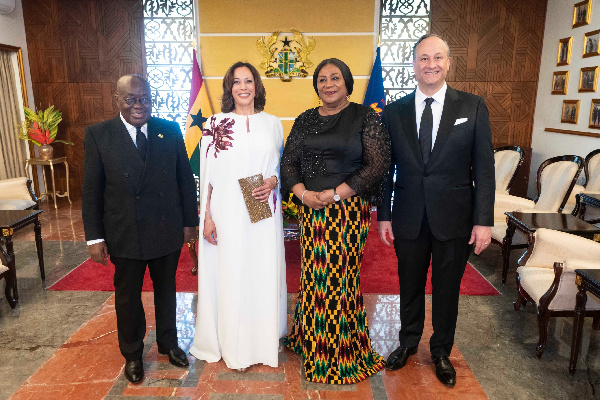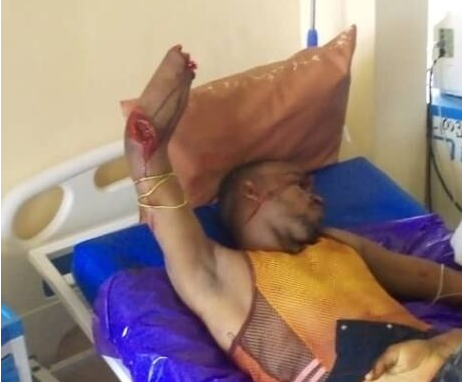FULL TEXT: Remarks by Kamala Harris at a State Banquet hosted by Akufo-Addo

Mr. President, thank you for extending my name. (Laughter.) Abena. Is that it? There we are.
And greetings to all the Abena who are here tonight. (Laughter.)
Mr. President, Madam First Lady, Mr. Vice President, Mr. Chief Justice, to all the dignities and dignitaries who are here to the U.S. delegation, members of the United States Congress, and all of the friends and all of the members of the diaspora: Good evening.
Mr. President, I thank you for hosting this state banquet. Before I begin my toast, I will, however, address the tragedy that occurred at home in Nashville, Tennessee.
We do not know all the details yet, but we do know that because of this terrible act of violence, parents have lost children, families have lost loved ones, and this community has been changed forever.
So to the people of Nashville, please know that we are thinking of you and that you are in our prayers and in our hearts, and that Doug and I send you all of our best during this time of grief.
Now I will proceed with my toast.
As I begin this week-long visit across the continent of Africa, it is an honor indeed, Mr. President, to start here in Ghana.
I thank the members of Congress who have traveled with me — Senator Coons, Congresswoman Cherfilus-McCormick. And I thank you to all the Ghanaian officials who have received us so warmly and who have made this trip possible.
We are joined today by incredible leaders from Ghana and throughout the continent. And here with us tonight are also individuals from the United States who represent the glorious beauty of the African diaspora.
We have with us on this trip Oscar and Emmy winners, CEOs and media publishers, civil rights leaders and advocates, artists and academics, dignitaries and diplomats.
And, Mr. President, you are personally responsible for welcoming and encouraging the connection of the diaspora to this continent. Because of you, Mr. President, hundreds of thousands of Black Americans and members of the diaspora around the world
came here four years ago to participate in the Year of Return. (Applause.)
Because you are a student of history, and in the time during which I have come to know you, you take great joy in reminding us all of where we come from, but always with a glorious vision of where we also know we can be.
And because of you, members of the diaspora and those around the world have traveled to Ghana to remember the history of slavery, those who have come here to honor their lineage and to understand their ancestry. And now, through Beyond the Return, many more visit each year.
Your vision, Mr. President, made this possible. So, on behalf all of those who have made the return, all those from America who join you tonight, and all those who will return in the future, thank you, Mr. President. (Applause.)
President Joe Biden and I are committed to celebrate and strengthen the longstanding ties that connect our people and our nations. These ties are a source of pride and strength for both our countries.
Mr. President, this is a topic that you and I have often spoken about. Over these past two years, it has been my honor to work with you on these and many other critical issues.
When we first met at the White House in September of 2021, we started our conversation about the intertwined history between our two nations, a conversation about how we are, as nations, interconnected and interdependent.
Last December, you and I spoke at the diaspora forum at the United States-Africa Leaders Summit in Washington, D.C.
Waiting to take the stage, I was backstage as you spoke. And I watched, Mr. President, as you elegantly reminded the audience that, I quote, “destiny of all Black people, no matter where in the world they are, is bound up with Africa.”
I then announced, at that forum, that President Joe Biden would create a new Presidential Advisory Council on Diaspora Engagement in the United States.
Last month, both you and I attend the Munich Security Conference, representing our respective nations. There, you called for a change in the paradigm of the continent’s relationship with the world, a point with which I agree and reinforced when I spoke during my own appearance in Munich.
And now it is my honor to be here to continue that conversation, to build on our work together, and to discuss our shared destiny.
Mr. President, Ghana’s leadership and advocacy on the world stage is not only vital, it is inspiring, historically so. As you have mentioned, on March 6th, 1957, when Ghana gained independence, it inspired millions of Americans, as it did for millions around the world, including Reverend Dr. Martin Luther King, Jr., who came here to witness the dawn of a new era.
Dr. King, as we all know, and he wrote, was deeply moved by what he saw here. He wrote and spoke of it for years after. He spoke and wrote about what Ghana was teaching the world.
And he predicted that Ghana’s independence, and I will quote, “will have worldwide implications and repercussions, not only for Africa, but for America.” “Ghana,” he said, “tells us that the forces of the universe are on the side of justice.”
This remains true today. Ghana is a leading voice for democracy and a leading voice in the march for freedom, justice, and liberty. (Applause.)
While we face real challenges, I look around tonight and I am truly more optimistic than ever. And I know that by working together, the United States and Ghana, alongside the diaspora and the people of this beautiful continent, will share and share our future for the better.
I thank you. And I raise this approaching glass –(laughter) — to you, Mr. President. And thank you for the warm welcome and visit. Thank you.





